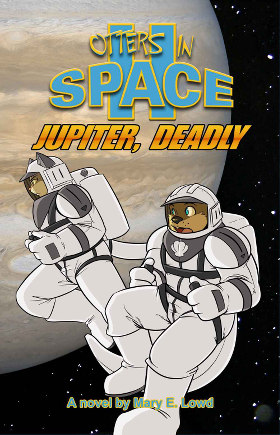octopus
Review: 'Otters in Space II: Jupiter, Deadly', by Mary E. Lowd
Posted by Fred on Wed 6 Nov 2013 - 02:38 This is credited as the Second Edition; but it went on sale at Anthrocon 2013, July 4-7, while the Kindle and Smashwords first editions have an August 24 and 25, 2013 publication date. That’s later.
This is credited as the Second Edition; but it went on sale at Anthrocon 2013, July 4-7, while the Kindle and Smashwords first editions have an August 24 and 25, 2013 publication date. That’s later.
Does anyone besides me care about this bureaucratic trivia? This is a good read, in a handy trade paperback edition for those who don’t want to read it on their computer. Get it in one format or the other.
But this is a direct sequel to Lowd’s Ursa-Major-nominated Otters in Space: The Search for Cat Havana. If there is any flaw with Otters in Space II, it is that you need to have read the first book to really understand it. Or at least read the review of it, in Flayrah on February 6, 2012.
Dallas, TX, FurPlanet Productions, July 2013, trade paperback $9.95 (227 pages), Kindle $6.99.
Animation: 'Science Fare'
Posted by Fred on Mon 10 Dec 2012 - 02:47Cartoon Brew has posted a sample of “Mike Carlo’s Cartoon Madness” to illustrate the Titmouse, Inc. animator’s personal short films. The 3’52” “Science Fare” was pitched to Nickelodeon a year ago. I guess that it did not sell.
The CB’s Jerry Beck says of Carlo's animation,
These are very polished, professional cartoons that look as good – and are just as funny – as anything on Adult Swim or Comedy Central. I predict he’ll be running his own show very soon.
I don’t care for the Adult Swim or Comedy Central style of animation, but “Science Fare” certainly is anthropomorphic.
New Octopus species master of disguise
Posted by GeneBreshears on Thu 6 Sep 2001 - 16:23Science News Online reports a species of octopus which is so new, it doesn't have an official scientific name, has the ability to mimic a large number of venomous creatures, included the sea snake, lion fish, and flat fish. While the octopus's ability to mimic the ocean bottom has been well-documented, and many other species of animals use mimicry as a defense, this is the first documented case of a species that not only mimics a multitude of species, but appears to choose which animal to pretend to be based on the menace it is facing.
While we're on the topic of smart invertebrates, BBC News reports that nerve bundles in the arms of an octopus are programmed with the necessary information to perform various motions on their own.